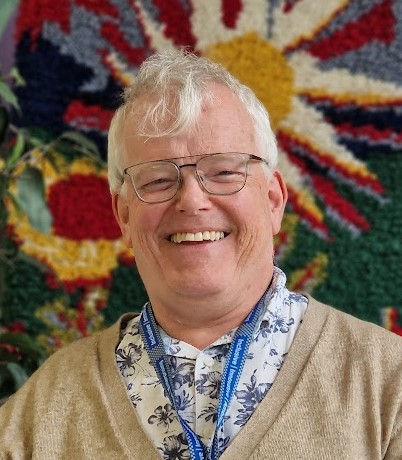1. Welcome to the DAPPLE project!
- Irene Tuffrey-Wijne

- Oct 20, 2024
- 4 min read
Updated: Nov 19, 2025

Written by Prof Irene Tuffrey-Wijne (Project Lead)
I’m delighted to welcome you to the DAPPLE project, this brand-new website and our first blog post. Whoever you are, wherever you’re reading this: WELCOME!
You will find plenty of information on this website, including a wonderful video presented by my colleagues with a learning disability. What is the DAPPLE project, who is doing it, why are we doing it, what will we do?
Let me tell you a little bit more about it.
WHAT is the DAPPLE project?
The official study title is full of jargon…
Developing effective service models for Adult Palliative and end of life care for People with a LEarning disability. (Can you spot the DAPPLE in there somewhere?)
In simpler words, this means: How can we make sure that all people with a learning disability get good care, at the right time (not too early, not too late), when they are getting closer to the end of their life?
Good care should not be a post-code lottery, nor a one-off because you happen to be lucky with your excellent nurse who understands your needs. So, we need to find (or develop, if we can’t find them) effective service models.
WHY are we doing the DAPPLE project?
I know good care is possible, because I have seen it. Here are some of the winners of the Linda McEnhill Award, which recognises outstanding palliative and end of life care for people with a learning disability:
In 2012, a palliative care consultant in Hertfordshire set up monthly meetings with community learning disability teams, to talk about any person with a learning disability who might die within the year ahead. Hospice referrals rocketed, and many more people received the support they needed at the end of life.
In 2010, a learning disability nursing home at St Anne’s Community Services in Kirklees (West Yorkshire), where one of the longstanding residents developed dementia and end of life care needs. The entire staff team, not used to caring for people who were close to dying, completed a comprehensive training programme and brought in relevant outside professionals where needed.
Five years later, in 2015, St Anne’s Community Services won the award again. Their homes had teamed up with the hospice next-door to produce a training package plus some specially adapted tools to assess people’s needs. Kirklees commissioners made the training mandatory for all learning disability services.
In 2018, St Christopher’s Hospice developed and delivered a structured programme to 60 learning disabilities care homes within the London borough of Croydon, aimed at improving access to timely healthcare treatment and palliative care to their residents, where needed.
That’s just a selection of amazing projects. There were also winners where just one nurse, or one family, or one small care home, provided inspirational end of life care to someone they loved and cared for.
Doesn’t all this sound good? But what makes it work? What can we learn from that one nurse, so others can do the same? How can good practice be sustained, so it doesn’t all collapse when the person leaves? Because I’ve seen that too. Award-winning practice that simply disappeared when the championing practitioner left, and the next person had other priorities. Or when project funding dried up.
Over the years, myself and other research leaders have tried to figure out small pieces of the puzzle that leads to overall good care at the end of life.
How to break bad news and talk about dying.
How to support people with a learning disability and their families as they grow older.
How to involve and support end of life care planning with people with a learning disability.
We have asked people all over the country, indeed all over Europe, what GOOD looks like in providing palliative and end of life care to people with a learning disability.
So…
We know a lot about what good looks like (although we can always learn more).We know it is possible.
We don’t know how to make sure GOOD happens, consistently, all the time, for everyone.
That is what The DAPPLE Project will try to find out. We will look at national databases. We will search the literature for knowledge we may have missed. We will send researchers into four different parts of the country, to see what is actually happening with people with a learning disability who have palliative care needs, and how they (and their families) experience their care and support. In those four areas, we will talk with people with learning disabilities, families, staff, managers and commissioners. Two of the areas are Kirklees and Croydon, where we will work with St Anne’s Community Services and St Christopher’s Hospice. We hope to find out what works well and what is difficult.
WHO is doing the DAPPLE project?
We have teamed up with some amazing experts from The Open University, LOROS Hospice and the University of Leicester (you can meet them all here[IT2] and see who is doing what). We are ready to go with teams of old and new researchers, including two new researchers with a learning disability (welcome Sunny and Jordan!). One of their tasks is to set up a co-production group of 10 people with a learning disability, who will meet every month to ponder whatever we find out in this project.

Follow us
Buckle up for the ride! This will take three years. It’s a big project, with lots going on. There will be lots coming out of it. We will keep you posted. There will be webinars, blog posts and social media activity (LinkedIn, Facebook, Bluesky, X). Look for @DAPPLEproject
Do let us know what you think. The more we learn from everyone (including you), the better, so tell us of your experience. We are all in this together.
Written by Professor Irene Tuffrey-Wijne (Project Lead, Kingston University)







Comments